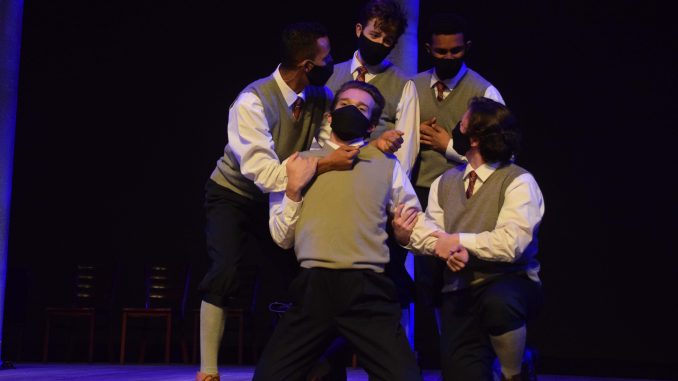
Caitlin Navarrete did not know how much she missed being surrounded by a cast and crew until in-person rehearsals for “Spring Awakening” began this semester.
“I didn’t realize how emotional I would be,” said Caitlin Navarrete, a senior musical theater major playing Wendla Bergman in “Spring Awakening.” “Even just at our dress rehearsals this past week, I didn’t realize how amazing it would feel to sing on a stage in the theater.”
After more than a year of stitching together videos of performers in their tiny apartments, actors and directors from Temple University’s School of Theater, Film and Media Arts were excited for the return of live productions this fall. Despite the optimism about a return to the stage, the pandemic still looms large for how performers prepare for and execute their roles.
The first live show of the year was “Spring Awakening,” a coming-of-age musical about teenagers who feel silenced and controlled by society, which debuted at Tomlinson Theater on Norris Street near 13th. The theater is operating at 25-percent capacity and only distributing 100 tickets per live show to ensure audiences can physically distance themselves, said Jason Lindner, assistant director of marketing and communications at the School of Theater, Film and Media Arts.
All audience, cast and crew members were fully masked during the show, and scenes that featured physical touch were cut or adapted, Lindner said. The costume department created special masks for performers to accommodate their body microphones and reduce the spread of droplets — which could potentially spread COVID-19 — released while they talk and sing.
Although the incorporation of masks has made cast members like Navarrete feel safer, it also makes performing more difficult, she said.
“We have to tell the story properly and with the most conviction that we can with that barrier still in place,” Navarrete said. “It’s made me more aware of my body and how holding my body a certain way can tell a different story to the audience than I would have previously realized when I just use my face.”
Tessa Seals appreciated the directors incorporating a fully-masked cast into the show, as it made the play feel more modern, she said. She could still connect with the characters and feel the raw emotions despite the cast wearing masks, she added.
“It was absolutely amazing,” said Seals, a freshman film and media arts major. “I cried. It was a lot of different things at once, and I felt like I could relate to it because I could feel what [the characters] felt at the same time,” Seals said.
As the cast began in-person rehearsals for “Spring Awakening” in late August, performing and rehearsing with fellow cast members was a refreshing experience for actors like Lauren Esser, a senior musical theater major playing Ilse Neumann in “Spring Awakening”.
“The energy in the room and the energy that you get, like, from a scene partner in person — that relationship really can’t be replicated virtually,” Esser said. “So it’s really, really great to be able to do that and be on the stage and in the theater and doing all of that again.”
Before this semester, Temple’s theater department rehearsed and performed virtually through Zoom since the COVID-19 pandemic began in March 2020. The department provided cast members with ring lights, tripods and costume pieces, Lindner said.
Nick Erholm, a senior musical theater major playing Melchior Gabor, the 14 year-old protagonist, in “Spring Awakening,” performed in one Zoom play last fall, “Iron John: An American Ghost Story” and, although the department provided equipment, navigating lighting and angles was difficult in Erholm’s bedroom, he said.
Erholm is happy to be performing live again and not needing to worry about the technicalities of adapting to performing virtually, like adjusting lighting and camera angles from his apartment and recording his performance, in addition to remembering lines, dance moves and songs, he said.
“It feels really good to be back on stage, like in that environment, because it’s so much different than being stuck in my room,” Erholm said.
After finally performing in front of a live audience for the first time in a year and a half, Navarrete is grateful, she said.
“Hearing actual applause is something that I haven’t heard in a while,” Navarrete said. “And, obviously, like, it’s a trope that actors live for applause, but it really is true. I’m just happy to tell the story to an audience that can actually react in real time.”



Be the first to comment